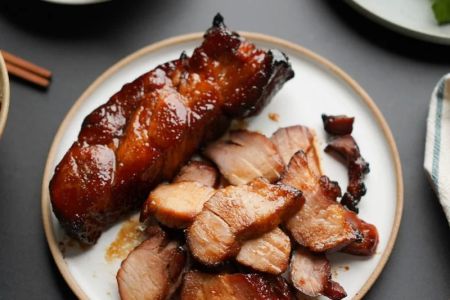Where Do Chinese Restaurants Get Crispy Seaweed From?
If you’ve ever dined at a Chinese restaurant, you’ve likely encountered the crunchy and addictive crispy seaweed appetizer. It’s crispy, salty, and full of flavor, but have you ever wondered where Chinese restaurants source the seaweed for this dish? Over the years, I’ve been on a journey to uncover the mystery of crispy seaweed and its origins in Chinese cuisine. Let me take you through my findings and what I learned along the way.
1. The Secret Behind Crispy Seaweed
Crispy seaweed, often served as an appetizer in Chinese restaurants, is made from a type of seaweed called nori, which is the same seaweed used in sushi rolls. However, the seaweed served in Chinese restaurants is typically fried, resulting in the crispy texture that gives it its signature crunch. I was surprised to learn that this dish, often thought of as a Chinese delicacy, is actually more common in Chinese-American cuisine. It’s a fusion of traditional Chinese ingredients and Western techniques.
1.1 The Role of Seaweed in Chinese Cuisine
While crispy seaweed may seem like a modern invention, seaweed has been used in Chinese cuisine for centuries. In traditional Chinese dishes, seaweed is often used in soups, stews, and salads, prized for its nutritional value and ability to balance flavors. The variety of seaweed used in crispy seaweed is typically nori, but some restaurants may use other types of edible seaweed, such as dulse or wakame, depending on regional availability and taste preferences.
2. The Journey of Seaweed to the Kitchen
So where do Chinese restaurants get their crispy seaweed from? I dug a bit deeper and found that the process of obtaining crispy seaweed starts with sourcing the right type of seaweed. Nori, the most commonly used seaweed for this dish, is primarily grown in farms off the coast of Japan, South Korea, and China. These countries have a long history of cultivating seaweed for various culinary uses, making them the main suppliers of seaweed for the global market.
2.1 The Global Seaweed Trade
What’s fascinating is that despite seaweed being a traditional food item in many Asian countries, the global seaweed trade is quite substantial. Chinese restaurants, especially those in the U.S., import seaweed from suppliers who source it from large-scale seaweed farms. After harvesting, the seaweed is processed, dried, and packaged before being shipped to restaurants and grocery stores around the world. This makes it relatively easy for Chinese restaurants to obtain high-quality seaweed for their crispy seaweed dishes.
2.2 What Makes the Seaweed Crispy?
Now that we know where the seaweed comes from, let’s talk about how it turns into the crispy, golden treat we all love. After the seaweed is dried, it’s often fried in oil. The heat causes the moisture in the seaweed to evaporate, giving it that crisp texture. Many restaurants coat the seaweed with a light dusting of flour or cornstarch before frying, which helps achieve the perfect crunch and prevents the seaweed from getting soggy. Some restaurants might even add a pinch of seasoning, such as salt or sugar, to enhance the flavor.
3. The Art of Preparing Crispy Seaweed
Preparing crispy seaweed is an art form in itself. I’ve had the chance to speak with a few chefs who specialize in Chinese cuisine, and what I learned is that making this dish requires precision. The temperature of the oil is crucial, as too hot or too cold oil can result in either burnt or limp seaweed. The frying process takes just a few seconds, so timing is everything. Once the seaweed is fried to perfection, it’s placed on paper towels to absorb any excess oil before being served to hungry customers.
3.1 Variations in Preparation
While the fried version of crispy seaweed is the most popular, some restaurants opt for a healthier alternative by baking the seaweed. Instead of deep-frying, they brush the seaweed with a small amount of oil and bake it in the oven at a low temperature. The result is still crispy, but with less fat, which might be preferred by customers looking for a lighter version of the dish. The baked seaweed retains more of its natural flavor and texture, providing a different yet delicious experience.
4. Where to Find Crispy Seaweed Near You
If you're craving crispy seaweed and wondering where to find it, there are plenty of options available. I’ve visited many Chinese-American restaurants in the U.S. that offer crispy seaweed as a staple appetizer. Most Chinese buffets and take-out places also include this dish in their menu. The dish is generally affordable and served in large portions, making it an excellent option for sharing with family and friends.
4.1 Exploring Chinese-American Restaurants
The best places to find crispy seaweed are at Chinese-American restaurants. Many of these restaurants pride themselves on offering traditional dishes with a modern twist. The crispy seaweed, while not a traditional Chinese dish, has become a favorite in many Chinese-American restaurants across the country. In cities with a large Chinese population, you can often find this dish at both casual and upscale dining spots. Whether you're in New York, Los Angeles, or San Francisco, there’s no shortage of places serving this crispy delight!
4.2 Check Local Grocery Stores
Another option is to visit your local grocery store. Many Asian grocery stores sell dried nori and other seaweed varieties, which you can use to make your own crispy seaweed at home. Some stores even offer pre-seasoned nori sheets that you can fry at home for a quick and delicious snack. If you’re a fan of DIY cooking, this is a great way to enjoy crispy seaweed whenever you want!
5. Enjoying Crispy Seaweed at Home
Making crispy seaweed at home is easier than I initially thought. All you need is some dried nori, oil for frying, and a little seasoning. I like to use a light touch with the seasoning, opting for a bit of sea salt or even a sprinkle of sugar to balance the flavors. The process is quick, and in less than 10 minutes, you’ll have a batch of crispy, golden seaweed ready to enjoy. It’s the perfect snack to serve at parties or as a side dish with your favorite Chinese meal.
5.1 Experiment with Flavors
If you want to get creative, try experimenting with different flavors for your crispy seaweed. Adding a splash of sesame oil, a dash of chili flakes, or even a sprinkle of sesame seeds can elevate the dish and give it a unique twist. I love making it spicy by adding a few chili flakes to the oil before frying the seaweed. It’s a simple way to customize your crispy seaweed to your taste.






![Top Chinese Restaurants for Authentic Cantonese Cuisine in [Your City]](https://img.gochinarose.com/d33/2507/4157910400_450x300.webp)
